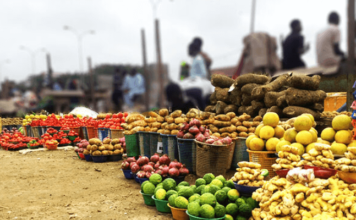In May, high food prices continued to strain the wallets of Nigerians, with food inflation soaring to 40.66 percent.
The costs of essential items such as garri, potatoes, fish, and meat were significant contributors to this rise. According to the National Bureau of Statistics (NBS), overall inflation reached a 28-year high of 33.95 percent.
Core inflation, which excludes agricultural produce and energy, also rose to 27% from 26.8%. The persistent increase in costs is putting pressure on household budgets, affecting market stability, and impacting investment landscapes across Nigeria. Economists predict that annual inflation may peak at 35 percent in the coming months before gradually decreasing to around 32 percent by the end of the year. They also foresee the Central Bank of Nigeria (CBN) concluding its rate-hiking cycle in July, having increased interest rates by 14.75 percentage points since May 2022 to the current 26.25 percent in an effort to control inflation and stabilize the currency.
May marked the seventeenth consecutive month of accelerating inflation. However, month-on-month headline inflation slightly slowed to 2.14 percent in May 2024 from 2.29 percent in April 2024, representing the second broad-based decline since October 2023. The NBS identified the primary drivers of inflation as food and non-alcoholic beverages (17.59 percent), housing, water, electricity, gas, and other fuel (5.68 percent), clothing and footwear (2.60 percent), transport (2.21 percent), and furnishings and household equipment and maintenance (1.71 percent).
The Consumer Price Index (CPI), which measures price changes in goods and services, revealed that May’s food inflation rate was 15.56 percentage points higher compared to 24.82 percent in May 2023. The increase was driven by higher prices of Semovita, oat flakes, prepackaged yam flour, garri, beans, Irish potatoes, yam, water yam, palm oil, vegetable oil, stockfish, mudfish, crayfish, beef head, live chicken, pork head, and bush meat.
A 2024 World Food Programme report attributed the rising food prices to ongoing conflicts in key agricultural states, high input and transportation costs, and a heavy reliance on market purchases. Analysts at Comercio Partners Research noted that high inflation, especially in food prices, has eroded purchasing power and negatively impacted consumer spending, a crucial driver of economic growth. As a result, households are prioritizing spending and skipping meals amid shrinking incomes. In 2023, Picodi, an international e-commerce organization, reported that Nigerian households spend 59 percent of their income on food, the highest globally. Organized labor is currently negotiating higher wages for workers to counteract the impact of inflation.
According to the NBS and the Global Alliance for Improved Nutrition’s ‘Cost of Healthy Diet’ report, the cost of a healthy diet rose by 110.7 percent to N1,035 per day in April 2024 from N491 per day in the same period last year. Nigerians have been expressing their concerns over these high prices. On the social media platform X, SisiYemmie tweeted, “I don’t know how people are not panicking because of this food inflation because I’m low-key panicking.” Another user, Ayin Ibibio, added, “I’m panicking. I’ve been panicking. But what can I do? I cannot generate health problems from panicking because of inflation.”
Last year, President Tinubu declared a state of emergency regarding food insecurity and unveiled an intervention plan for food security, affordability, and sustainability. This plan included the immediate release of fertilizers and grains to farmers and households to mitigate the effects of subsidy removal. In February, Abubakar Kyari, Minister of Agriculture and Food Security, expressed the Federal Government’s readiness to distribute 42,000 metric tons of assorted grains to Nigerians in response to the rising food crisis. He mentioned ongoing efforts to increase food production and plans to incentivize farming.
Wale Edun, the Minister of Finance and Coordinating Minister of the Economy, stated in June that food prices would begin to decline and food availability would increase as inflation slows. He emphasized the government’s commitment to boosting agricultural production to ease high inflation. “Agricultural output is up to bring down inflation. Inflation is slowing month on month. Food prices will come down; food availability will increase,” said the finance minister.
However, the recent scarcity of essentials such as tomatoes is expected to exacerbate food prices further, likely contributing to a surge in food inflation in July. To combat rising inflation, the Central Bank of Nigeria has been increasing its monetary policy rate, which now stands at 26.25 percent. The World Bank, in its ‘Global Economic Prospects’ report, noted the possibility that the tightening of monetary policy may not fully control inflation.
